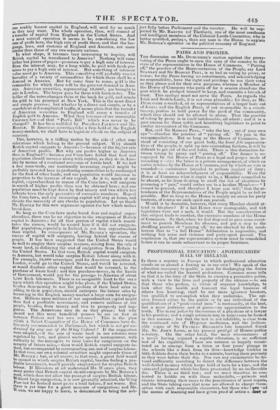PAIRS AND PROXIES.
THE discussion on Mr. DtiNcomnes motion against the proxy- voting of the Peers ought to open the eyes of the country to the state of the representation in the House of Commons. "Pairing off," the practice of the Representatives of the People, say Lord STANLEY and Sir ROBERT PEEL, is as bad as voting by proxy, or worse; for the Peers having no constituents, and acknowledging no responsibility, have the right and privilege to use their votes as they please and for their own purposes, whereas a Member of the House of Commons who pairs off for a session abandons the post which lie pledged himself to keep, and commits a breach of trust. This apology must not serve the Peers. As regatds the Irish and ScotcloLords, it is not even plausible; for they, as Mr. DUNCOAIHE remarked, sit as representatives of a larger body cut of doors; and the English Peers, if not responsible to a consti- tuency, profess to hold power for the good of the community, which they should not be allowed to abuse. That the practice of voting by proxy is in itself indefensible, all admit ; and it is a poor excuse for these noble and hereditary legislators to point to similar misconduct of the Commons.
But, said Sir ROBERT PEEL, "take the bea. . out of your own eye "—abandon the practice of " pairing off." We join in the recommendation. But as long as the House of Commons, in- stead of consisting of one great body, the bond fide representa- tives of the people, is split up into contending factions, it will be difficult to get rid of the evil habit. There is this distinction be- tween voting by proxy and " pairing off." The former is re- cognized by the house of Peers as a legal and proper mode of recording a vote : the latter is a private arrangement, of which no notice is taken by the House of Commons, and by which no vote is recorded—a contrivance intended to palliate neglect of duty; it is at least an acknowledgment of responsibility. Were the House of Commons what it ought to he, a Member compelled to be absent, so far from desiring to swell time list of absentees by procuring a " pair," would rather say to a brother Member— " I cannot be present, and therefore I hope you will," that the at- tendance of the Representatives of the People might be as full as
possible. But as lung as the House is mainly aim arena for party contests, of course no such spirit can prevail.
Would it be desirable, however, that every Member should at- tend in his place? If a full House were manageable, and 658 legislators were not a mob, it would. But the consideration of this subject leads to another, the excessive numbers of the house or commons. So that, when we feel disposed to pass sonic enact- ment to punish Members for absence, and put a stop to the shuffling practice of " pairing off, we are checked by the recol- lection that in " a full House" deliberation is impossible, and nothing but noise and violence and party-spirit prevail. Tho conclusion is, that our representative system must be retuodelled before it can be made subservient to its proper functions.


























 Previous page
Previous page